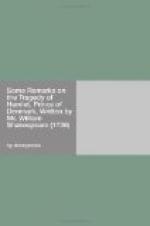Hamlet’s whole Conduct, during the Play which is acted before the King, has, in my Opinion, too much Levity in it. His Madness is of too light a Kind, although I know he says, he must be idle; but among other Things, his Pun to Polonius is not tolerable. I might also justly find Fault with the want of Decency in his Discourses to Ophelia, without being thought too severe. The Scene represented by the Players is in wretched Verse. This we may, without incurring the Denomination of an ill-natur’d Critick, venture to pronounce, that in almost every Place where Shakespeare has attempted Rhime, either in the Body of his Plays, or at the Ends of Acts or Scenes, he falls far short of the Beauty and Force of his Blank Verse: One would think they were written by two different Persons. I believe we may justly take Notice, that Rhime never arrived at its true Beauty, never came to its Perfection in England, until long since Shakespeare’s Time.
The King’s rising with such Precipitation, and quitting the Play upon seeing the Resemblance of his own foul Crime, is very much in Nature, and confirms the Penetration of our Author’s Hero.
Page 302.
Hamlet’s Pleasantry upon his being certified that his Uncle is Guilty, is not a-propos in my Opinion. We are to take Notice that the Poet has mix’d a Vein of Humour in the Prince’s Character, which is to be seen in many Places of this Play. What was his Reason for so doing, I cannot say, unless it was to follow his Favourite Foible, viz. that of raising a Laugh.
Page 306.
The Prince’s Resolution upon his going to his Mother, is beautifully express’d, and suitable to his Character.
Page 306, 307.
What Rosincrantz says of the Importance of the King’s Life, is express’d by a very just Image.
Page 307.
The King’s seeming so very much touch’d with a Sense of his Crime, is supposed to be owing to the Representation he had been present at; but I do not well see how Hamlet is introduced so as to find him at Prayers. It is not natural, that a King’s Privacy should be so intruded on, not even by any of his Family, especially, that it should be done without his perceiving it.
Page 309.
Hamlet’s Speech upon seeing the King at Prayers, has always given me great Offence. There is something so very Bloody in it, so inhuman, so unworthy of a Hero, that I wish our Poet had omitted it. To desire to destroy a Man’s Soul, to make him eternally miserable, by cutting him off from all hopes of Repentance; this surely, in a Christian Prince, is such a Piece of Revenge, as no Tenderness for any Parent can justify. To put the Usurper to Death, to deprive him of the Fruits of his vile Crime, and to rescue the Throne of Denmark from Pollution, was highly requisite: But there our young Prince’s Desires should have stop’d, nor should he have wished to pursue the Criminal in the other World, but rather have hoped for his Conversion, before his putting him to Death; for even with his Repentance, there was at least Purgatory for him to pass through, as we find even in a virtuous Prince, the Father of Hamlet.




